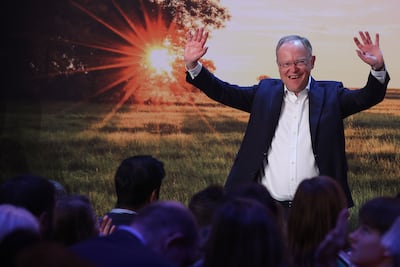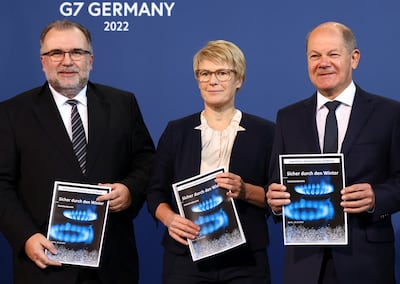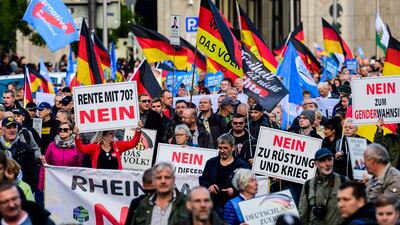The far-right Alternative for Germany (AfD) party was celebrating a comeback on Monday after almost doubling its vote in a regional election.
But Chancellor Olaf Scholz’s Social Democratic Party (SPD) also had reason to cheer after holding off the main opposition party to win the vote in Lower Saxony.
The campaign took place against the backdrop of a mounting energy crisis, as Europe’s biggest economy faces high prices and the threat of power cuts this winter.
The AfD criticised the government’s energy policies, called for an end to sanctions imposed against Moscow after the invasion of Ukraine and said Germany should activate the Nord Stream 2 pipeline from Russia.
It was rewarded with a vote share of 10.9 per cent, up from 6.2 per cent in 2017, in a western state that is far from a natural heartland.
The result put an end to a streak of 10 consecutive elections since 2020 at which the AfD had lost ground.
“It is a cry for help from the people, for a change of policy in the most dangerous crisis for decades,” said Leif-Erik Holm, the deputy leader of the party’s MPs.
“Hardly anyone can understand why the Scholz government, in this energy crisis, is not bringing every available power plant on to the grid.”

Critics accuse the AfD of cynically stirring up fear during the energy crisis, after pivoting from the anti-lockdown stance that was a key selling point in recent years.
There are concerns in Berlin that rising prices could lead to radical protests similar to those during the pandemic.
“The AfD always grows stronger when the social climate is dominated by fear. It has no interest in assuaging that fear,” said Laura-Kristine Krause, head of the More in Common non-profit organisation that aims to tackle social division and polarisation.
“Democratic parties have to do that, listen, and communicate differently with a worried population than they would in normal times.”
Mr Scholz’s SPD won the election with 33.4 per cent of the vote. The opposition Christian Democrats were second with 28.1 per cent.
The result was a relief for the SPD after national polls showed them running in third, following criticism of Mr Scholz's policies and governing style.
“Lower Saxony will remain in good hands,” said Mr Scholz, after the result put Stephan Weil, SPD premier in the region, on course to stay in power.
There were mixed fortunes for Mr Scholz’s coalition partners. The Greens gained ground by taking 14.5 per cent, but the liberal Free Democrats (FDP) were down on 4.7 per cent.
The most senior Green in the cabinet, Vice Chancellor Robert Habeck, had raised eyebrows by announcing a nuclear plant in Lower Saxony would shut down even as two others were kept in emergency reserve.

Although there was some speculation of a U-turn once the election was out of the way, environmentalists saw the result as confirming the nuclear switch-off after the FDP had lobbied against it.
Pollsters said the FDP appeared to have shed about 65,000 votes to the AfD in Lower Saxony. It will have no seats in the new parliament after missing the five per cent threshold to qualify.
FDP leader Christian Lindner acknowledged some of his party’s grass roots were unhappy at its co-operation with two left-leaning parties in Berlin.
“Some people don’t recognise the FDP as a liberal force and believe we’re now a left-wing party,” said Mr Lindner, the finance minister in the coalition.
The three coalition partners this month agreed to spend up to €200 billion ($194bn) subsidising energy bills to ease the economic pain.
A panel of experts handed a detailed proposal to ministers on Monday, in which consumers would receive a lump sum now and prices would be capped next year.
However, the plan caused some disquiet among other European countries that lack Germany’s fiscal firepower.
Mr Scholz said he had used a European summit in Prague last week to “clear up misunderstandings” about the package.


